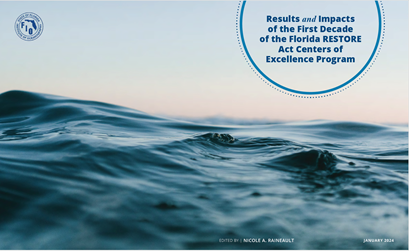 Dr. Sandra Brooke, Dr. Josh Breithaupt, and Dr. Dean Grubbs were among the many scientists who contributed to the "Results and Impacts of the First Decade of the Florida RESTORE Act Centers of Excellence Program" report. This report covers a variety of fields and projects within Florida in the aftermath of the BP Horizon Oil Spill.
Dr. Sandra Brooke, Dr. Josh Breithaupt, and Dr. Dean Grubbs were among the many scientists who contributed to the "Results and Impacts of the First Decade of the Florida RESTORE Act Centers of Excellence Program" report. This report covers a variety of fields and projects within Florida in the aftermath of the BP Horizon Oil Spill.
"Thriving coastal and Gulf environments that support wild and human lives. Sustainable fisheries for recreation and sustenance. Knowing where (and how) juvenile sea turtles travel when they leave Florida beaches and how they are impacted by harmful algal blooms. Better built environments and fewer invasive species. Oil spill impacts on sharks, large fishes, and dolphins. These are some of the goals of research through the Florida RESTORE Act Centers of Excellence Program (FLRACEP) funded by the U.S. Department of the Treasury.
The beauty and inspiring sights that draw millions of people to Florida’s coastal environments and waterways are now inextricably a combination of natural and human creation. Birds and beachcombers, fish and anglers, reefs both natural and artificial: communities on our Gulf Coast intermingle people, wildlife, human construct, and the environment. Florida’s economy depends on a pristine and healthy Gulf coast to draw and sustain inhabitants, tourists, and support recreational and commercial fisheries. When disasters suddenly impact the environment, people must work together and rapidly take stock of resources and losses to chart a path forward." - Nicole A. Raineault
Check out the report here.
FSUCML Contributions:
Pages 26 - 27 - Monitoring Oil Spill Effects & Recovery in Large Deep-Sea Fishes (R. Dean Grubbs)
Pages 36 - 37 - Hardbottom Mapping and Community Characterization of the West-Central Florida Gulf Coast (Sandra Brooke)
Pages 44 - 45 - Comparative Study of Carbon Storage in Restored Versus Natural Florida Gulf Coast Mangrove Systems (Josh Breithaupt)

